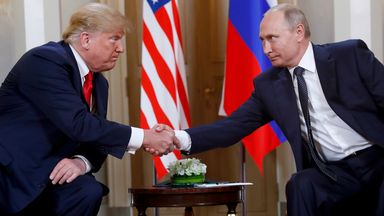What a Trump presidency would mean for global wars and European security
Donald Trump came close to direct war with Iran during his first term in office – while his record of unpredictability is a challenge for Washington’s closest allies, in particular for fellow members of the NATO alliance.

Donald Trump says he would end Russia’s war in Ukraine should he return to the White House – but any rushed deal will likely leave Kyiv much weaker and European security in even greater peril.
Another major flashpoint a Trump presidency would immediately seek to influence is the escalating conflict between Iran and Israel.
Mr Trump came close to direct war with Tehran during his first term in office and prior restraint could well give way to direct confrontation this time around.
US election latest: Harris and Trump make final pitches
Then there is the overwhelming longer-term challenge posed by China, with North Korea another growing headache especially after Mr Trump tried but failed to woo the leader of the hermit state during his first stint as commander-in-chief.
With the US election on a knife edge, hostile and friendly capitals around the world have been gaming what a second Trump White House might mean for their respective national interests and for the most pressing global security threats.
Mr Trump’s track record of unpredictability is a challenge for traditional foes – but also for Washington’s closest allies, in particular fellow members of the NATO alliance.
The Republican nominee has made no secret of his frustration at how the US has for decades bankrolled the security blanket that protects Europe.
During his first term as president, Mr Trump threatened to withdraw the US from the alliance – a move that would almost certainly sound its death knell. His rhetoric did help to spur allies to dig deeper into their pockets and spend more on their militaries, though.
But the damage of years of underinvestment is deep and the pace of recovery is too slow for European NATO allies and Canada to credibly stand on their own as a potent military force any time soon.
In terms of immediacy when it comes to global crises, the impact of a Trump victory on 5 November would be felt most acutely by Ukraine and also by Iran.
The presidential candidate has repeatedly claimed that he would quickly end the Ukraine war, though without explaining how or what peace would look like.
In an indication of where his priorities lie, however, he has accused Ukrainian President Volodymyr Zelenskyy of being the “greatest salesman on earth” for securing tens of billions of dollars in weapons and other assistance that Washington has given to Kyiv.
Yet – coupled with Ukraine’s willingness to fight – that military aid is the biggest reason why Ukraine has managed to withstand almost 1,000 days of Vladimir Putin’s war.
Stop the flow of American weapons, and Ukrainian troops – despite their own ingenuity and the support of other allies – will simply lack the firepower to keep resisting the onslaught.
By contrast, US vice president Kamala Harris, who is vying for the top job, has made clear that she views continued support to Ukraine as being as vital to US and Western interests as it is to Kyiv’s – a far more familiar stance that echoes the view of her NATO partners.
While US support for Ukraine would undoubtedly change under a Trump administration, that is not the same as facilitating a complete surrender.
The former president – who portrays himself as the ultimate dealmaker and has adopted a new election slogan – “Trump will fix it” – will not want to be held responsible for the total absorption of Ukraine into Mr Putin’s orbit.
Putin and Iran
His relationship with the Russian president is a particularly interesting dynamic.
When president, he infamously said he trusted Mr Putin’s denials over his own intelligence agencies when it came to claims about Russian interference in the 2016 US election.
But with the right advice, might a future President Trump be able to use his connection with Mr Putin to the West’s advantage?
At the very least, it adds a new level of unpredictability – which is perhaps the most important element when it comes to assessing the potential impact on the world of a second Trump term.
On Iran, in stark contrast to his approach to Russia’s war in Ukraine, a future President Trump may well back much greater US military support for Israel’s conflict against Tehran and its proxies – perhaps even direct involvement by US forces in strikes on Iran.
Mr Trump has an even tougher stance towards Tehran and its nuclear ambitions than Joe Biden’s administration.
His decision to rip up a major nuclear deal with Iran was one of his most significant foreign policy acts during his four years as president.
It is also personal, with Iran accused of hacking the Trump campaign in recent months – an attack that would surely only heighten tensions with Iran during any second Trump term.
Be the first to get Breaking News
Install the Sky News app for free


On election night, Sky News will have access to the most comprehensive exit poll and vote-counting results from every state, county and demographic across America through its US-partner network NBC.
You can find out more about Sky News’ coverage here.


